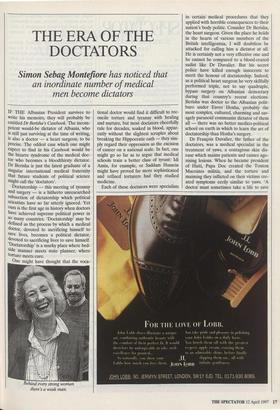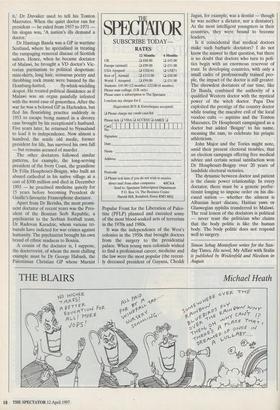THE ERA OF THE DOCTATORS
Simon Sebag Montefiore has noticed that
an inordinate number of medical men become dictators
IF THE Albanian President survives to write his memoirs, they will probably be entitled Dr Berisha 's Casebook. The incom- petent would-be dictator of Albania, who is still just surviving at the time of writing, is also a doctor — a heart surgeon, to be Precise. The oddest case which one might expect to find in his Casebook would be the bizarre syndrome of the medical doc- tor who becomes a bloodthirsty dictator. Dr Berisha is just the latest graduate of a singular international medical fraternity that future students of political science might call the `doctators'.
Doctatorship — this meeting of tyranny and surgery — is a hitherto unresearched subsection of dictatorship which political scientists have so far utterly ignored. Yet ours is the first age in history when doctors have achieved supreme political power in SO many countries. `Doctatorship' may be defined as the process by which a medical doctor, devoted to sacrificing himself to save lives, becomes a political dictator, devoted to sacrificing lives to save himself. Poctatorship' is a murky place where bed- side manner meets state planner, where torture meets cure.
One might have thought that the voca- Behind every strong woman there's a weak man. tional doctor would find it difficult to rec- oncile torture and tyranny with healing and nurture, but most doctators cheerfully rule for decades, soaked in blood, appar- ently without the slightest scruples about breaking the Hippocratic oath — they sim- ply regard their oppression as the excision of cancer on a national scale. In fact, one might go so far as to argue that medical schools train a better class of tyrant: Idi Amin, for example, or Saddam Hussein might have proved far more sophisticated and refined torturers had they studied medicine.
Each of these doctators were specialists in certain medical procedures that they applied with horrible consequences to their nation's body politic. Consider Dr Berisha, the heart surgeon. Given the place he holds in the hearts of various members of the British intelligentsia, I will doubtless be attacked for calling him a dictator at all. He is certainly not a very effective one and he cannot be compared to a blood-crazed sadist like Dr Duvalier. But his secret police have killed enough innocents to merit the honour of doctatorship. Indeed, as a political heart surgeon he very skilfully performed triple, not to say quadruple, bypass surgery on Albanian democracy during that country's recent elections. Berisha was doctor to the Albanian polit- buro under Enver Hoxha, probably the most complex, cultured, charming and sav- agely paranoid communist dictator of them all — there was no better medico-political school on earth in which to learn the art of doctatorship than Hoxha's surgery.
Dr Francois Duvalier, the father of the doctators, was a medical specialist in the treatment of yaws, a contagious skin dis- ease which maims patients and causes ago- nising lesions. When he became president of Haiti, Papa Doc created the Tonton Macoutes militia, and the torture and maiming they inflicted on their victims cre- ated symptoms eerily similar to yaws. 'A doctor must sometimes take a life to save it,' Dr Duvalier used to tell his Tonton Macoutes. When the quiet doctor ran for president — he ruled from 1957 to 1971 — his slogan was, 'A nation's ills demand a doctor.'
Dr Hastings Banda was a GP in wartime Scotland, where he specialised in treating the rampaging venereal disease of Scottish sailors. Hence, when he became doctator of Malawi, he brought a VD doctor's Vic- torian puritanism to political despotism: mini-skirts, long hair, sensuous poetry and throbbing rock music were banned by the Homburg-hatted, fly-whisk-wielding despot. He treated political dissidence as if Malawi was an organ painfully infested with the worst case of gonorrhea. After the war he was a beloved GP in Harlesden, but fled his flourishing practice suddenly in 1953 to escape being named in a divorce case brought by his receptionist's husband. Five years later, he returned to Nyasaland to lead it to independence. Now almost a hundred, the senile old medic, former president for life, has survived his own fall — but remains accused of murder.
The other doctators followed similar patterns, for example, the long-serving president of the Ivory Coast, the grandiose Dr Felix Houphouet-Boigny, who built an absurd cathedral in his native village at a cost of $300 million and died in December 1993 — he practised medicine quietly for 15 years before becoming President de Gaulle's favourite Francophone doctator.
Apart from Dr Berisha, the most promi- nent doctator of recent years was the Pres- ident of the Bosnian Serb Republic, a psychiatrist to the Serbian football team, Dr Radovan Karadzic, whom various tri- bunals have indicted for war crimes against humanity. The psychiatrist brought his own brand of ethnic madness to Bosnia.
A cousin of the doctator is, I suppose, the docterrorist, of whom the most chilling example must be Dr George Habash, the Palestinian Christian GP whose Marxist Popular Front for the Liberation of Pales- tine (PFLP) planned and executed some of the most blood-soaked acts of terrorism in the 1970s and 1980s.
It was the independence of the West's colonies in the 1950s that brought doctors from the surgery to the presidential palace. When young men colonials wished to find a professional career, medicine and the law were the most popular (the recent- ly deceased president of Guyana, Cheddi Jagan, for example, was a dentist — though he was neither a dictator, nor a dentator). As the most intelligent youngsters in their countries, they were bound to become leaders.
Is it coincidental that medical doctors make such barbaric doctators? I do not know the answer to that question, but there is no doubt that doctors who turn to poli- tics begin with an enormous reservoir of trust. In developing countries, with only a small cadre of professionally trained peo- ple, the impact of the doctor is still greater. The shrewdest doctators of our time, like Dr Banda, combined the authority of a qualified Western doctor with the mystical power of the witch doctor. Papa Doc exploited the prestige of the country doctor while touting the macabre evil of the local voodoo cults — aspirins and the Tonton Macoutes. Dr Houphouet campaigned as a doctor but added `Boigny' to his name, meaning the rain, to celebrate his priapic athleticism.
John Major and the Tories might note, amid their present electoral troubles, that an election campaign offering free medical advice and certain sexual satisfaction won Dr Houphouet-Boigny over 20 years of landslide electoral victories.
The dynamic between doctor and patient is the classic power relationship. In every doctator, there must be a genetic perfec- tionist longing to impose order on his dis- eased nation — whether the ailment is Albanian heart disease, Haitian yaws or Glaswegian syphilis transferred to Malawi. The real lesson of the doctators is political — never trust the politician who claims that the body politic is like the human body. The body politic does not respond well to surgery.
Simon Sebag Montefiore writes for the Sun- day Times. His novel, My Affair with Stalin is published by Weidenfeld and Nicolson in August.



































































 Previous page
Previous page